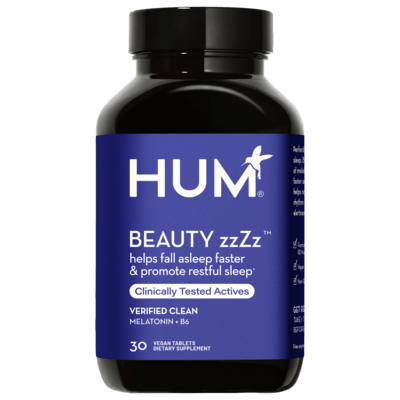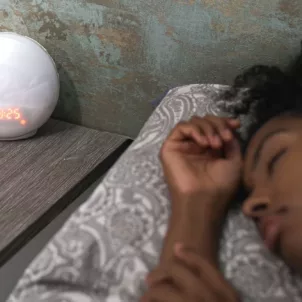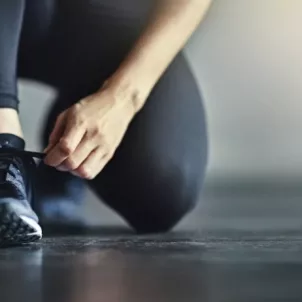You probably don’t need science to tell you if you’re a night owl or an early bird, but it turns out that your sleep personality, or chronotype, is actually more nuanced than just being a morning person or not. “A chronotype is your body’s natural disposition to be awake or asleep at certain times,” explains Michael J. Breus, PhD, a clinical psychologist, sleep specialist, and author of the upcoming book Energize!: Go from Dragging Ass to Kicking It in 30 Days.
But why do sleep chronotypes matter? Sleep research shows that your chronotype may have an impact on your health and aligning your lifestyle with your chronotype could have benefits in just about every area of your life. Read on to help you discover your sleep chronotype and how you can use it to your advantage.
What is A Chronotype?
Kelly Murray, a certified pediatric and adult sleep consultant and owner of Kelly Murray Sleep Consulting, describes chronotypes as the genetically predetermined timing of your sleep and wake cycles. (Yep, if you struggle getting up in the morning, you can just blame your parents!)
Chronotypes consider things like your sleep duration, how easy it is for you to wake up in the morning or fall asleep at night, and your activity and energy levels throughout the day.
In many studies, researchers have looked specifically at “morning types” and “evening types,” while Dr. Breus explains a later development was the traditional three chronotype model of the early bird, hummingbird, and night owl. Still, not everyone fits into that mold and the field of sleep science is rapidly developing. Dr. Breus identified a 4th chronotype, which became the basis for his Bear, Wolf, Lion, and Dolphin chronotype model (more on that below.)
In 2020, new research published in the journal Personality and Individual Differences actually discovered six distinct chronotypes, which further highlights the importance of understanding your unique sleep-wake patterns. (For instance, 1 in 300 are considered “advanced sleepers,” who may go to bed closer to 8 pm and wake up as early as 4 am, according to a 2019 study in Sleep.)
Chronotypes vs. Circadian Rhythms
Sleep chronotypes may be new to you, but you’ve probably heard of circadian rhythms. The two are closely related but distinctly different. “The circadian rhythm is the ebb and flow of the hormones that regulate our sleep and wake cycles—cortisol (the alert hormone) and melatonin (the sleepy hormone). Whereas, your chronotype is the timing of the release of these hormones,” explains Murray.
The biggest difference, Dr. Breus notes, is that while circadian rhythm is primarily influenced by light exposure, your chronotype is not affected by external forces.
What is My Sleep Chronotype?
By knowing whether you’re a Dolphin, Wolf, Lion, or Bear chronotype, you can time activities to maximize your productivity and sleep, says Murray. The ultimate goal is to “work with your biological clock and not against it.”
Dr. Breus developed this quiz to help you determine your exact chronotype. Get a preview of what your chronotype is and how you can adjust your schedule to optimize your life.
Bear Chronotypes
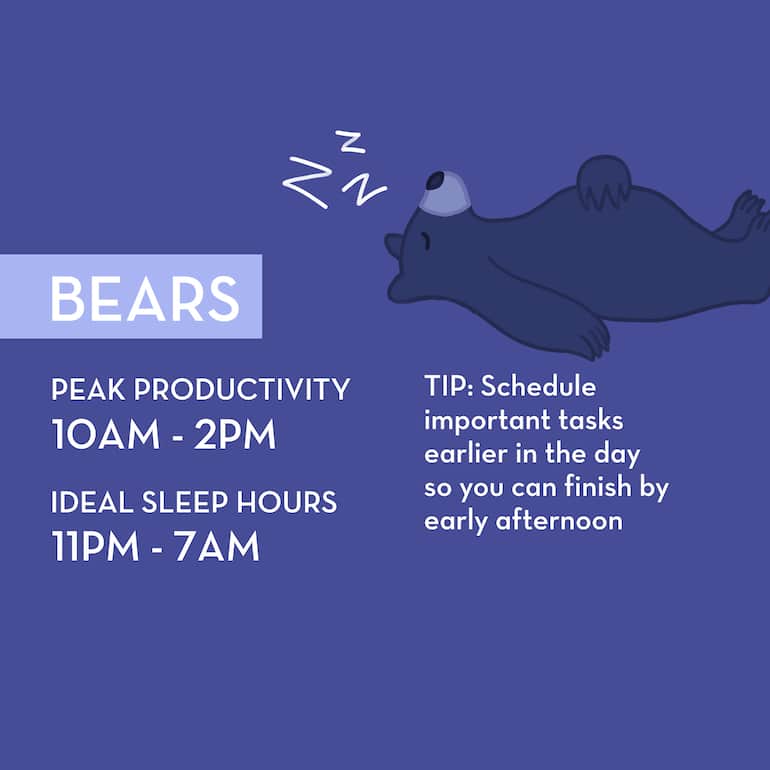
The majority of people—55 percent—are Bears. If you fall into this camp (den?) schedule important tasks earlier in the day so you can finish by early afternoon. “Bears start to crash around 3 pm,” says Murray. Strategically timed exercise can help combat that, though. “Exercising right before lunch will help them speed up their metabolism so that the food they eat converts into energy and helps to sustain them during the afternoon when they need to experience an energy dip.”
Ideal Sleep Hours: 11 pm-7 am
Peak Productivity: 10 am-2 pm
Sexual Peak: 7 am-9 pm, or when the sun is shining
Optimal Exercise Time: Pre-lunch
Wolf Chronotypes
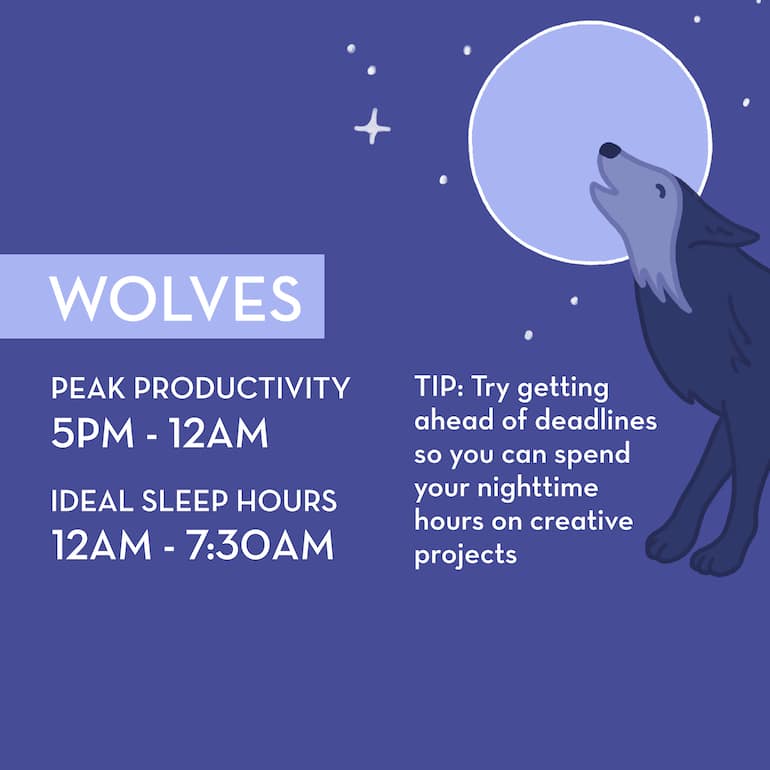
If you typically characterize yourself as a night owl, you may actually be a Wolf, along with 15 percent of people. This chronotype can be challenging if you work a job that requires you to be up early, but this tip from Murray can help: “It may feel counterintuitive, but wolves should exercise in the morning after breakfast to help stop their bodies from producing melatonin (the sleepy hormone) and produce cortisol instead (the alert hormone).”
If you’re working towards a big fitness goal, you may still be better served with an evening workout, though: One study in the journal Sports Medicine Open discovered late chronotypes perform worse in the morning across both physical and cognitive tests.
Try getting ahead of deadlines so you can spend your nighttime hours on creative projects.
And if you’re the partner of a Wolf, Murray recommends giving them time to wake up and not trying to go for early AM sex. Oh, and if you’re road tripping, let your night owl partner take the second shift: they drive much worse in the morning, according to research.
Ideal Sleep Hours: 12 am-7:30 am
Peak Productivity: 5 pm-12 am
Sexual Peak: 10 am-10:30 pm
Optimal Exercise Time: After breakfast
Lion Chronotypes
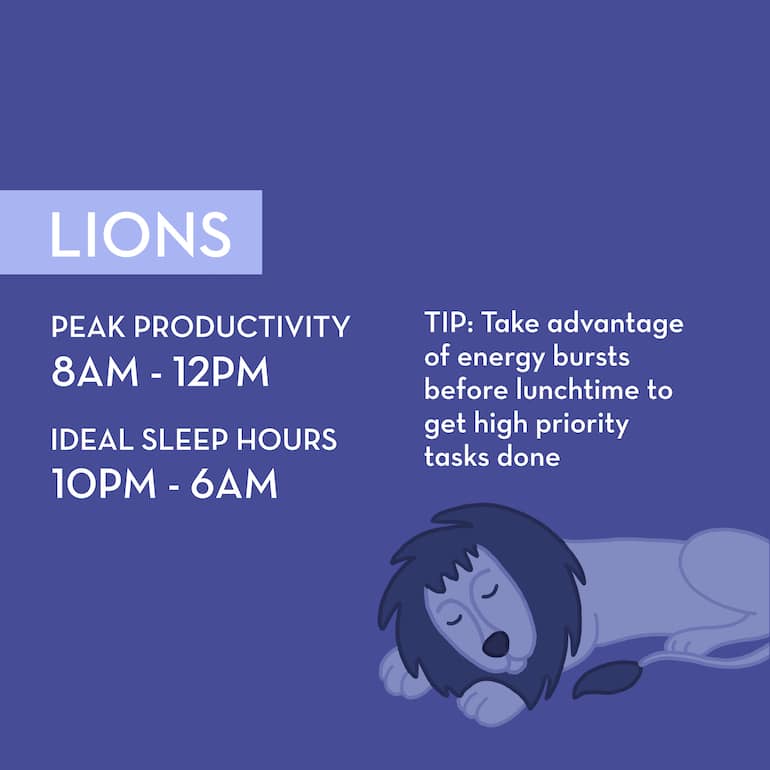
Around 15 percent of people are Lions, who feel the best early in the morning. Take advantage of energy bursts before lunchtime to get high-priority tasks done. This means you actually want to shift your workouts to later in the day. “Waiting until after work will give them the boost of energy they need to enjoy their friends and family in the evening,” explains Murray.
A caveat to that, though. If you’re an athlete or training for a race or big event, morning workouts can have an advantage for athletic performance. A 2017 study in the journal Sports Medicine found that morning-types had better athletic performance in the morning.
Ideal Sleep Hours: 10 pm-6 am
Peak Productivity: 8 am-12 pm
Sexual Peak: 6 am-7 am
Optimal Exercise Time: 5 pm-6 pm
Dolphin Chronotypes
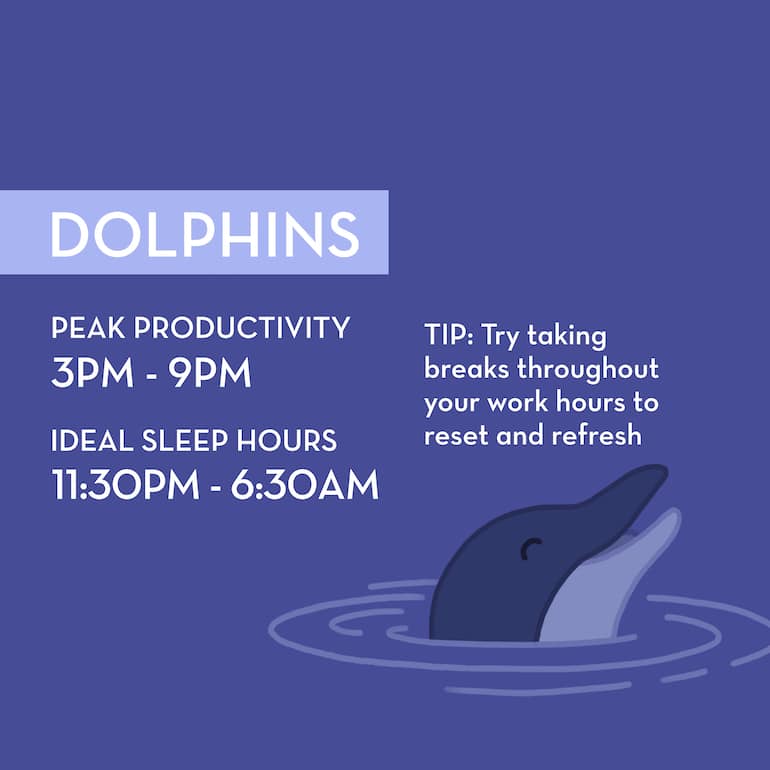
Only 10 percent of people are in the Dolphin pod, characterized by being light sleepers and feeling “wired and tired.” If you’re a Dolphin, you may feel tired throughout the day, so try taking breaks often to reset and refresh.
“Dolphins need to be careful of working too close to bedtime as they need time to shut down their busy brains,” explains Murray. She recommends Dolphins wrap their days up on the earlier side so they have plenty of time to relax, and use sex to help unwind at night and help create a positive association with their bed.
As for workouts, Dolphins can use AM sweat sessions to “increase their cortisol levels which will help them to shake off any grogginess.”
Ideal Sleep Hours: 11:30 pm-6:30 am
Peak Productivity: 3 pm-9 pm
Sexual Peak: 8 pm
Optimal Exercise Time: Upon waking
Is one sleep chronotype better than the other?
“All chronotypes have their advantages and disadvantages,” explains Murray. While there’s no ideal chronotype, unfortunately, research shows that there are more health risks associated with being an evening type (sorry, Wolves.) Of course it’s important to keep in mind that correlation does not equal causation.
A 2019 review of 36 studies found that evening-types were the most likely to have unhealthy dietary habits. They may also have a greater risk of heart disease and type 2 diabetes as compared to early risers as well as depression. Early risers had a 12 to 27 percent lower risk of being depressed than “intermediate” types.
If you’re a Wolf, you don’t have to fight your chronotype, but you also don’t want to let it run wild. Timing your meals correctly may help you to stay on a moderate schedule, suggests Dr. Breus. He recommends Wolves eat (not skip) breakfast, aim for a balanced lunch in the early afternoon, and stick to dinner around 8-9 pm.
Can you change your chronotype?
“Although it is not possible to change your chronotype, you are able to shift the timing of your natural circadian rhythm by an hour or two by timing certain activities such as light exposure, eating, and exercise,” says Murray.
Dr. Breus stresses that you cannot change your chronotype because it is genetic, but if your work schedule or social calendar really doesn’t add up to your natural chronotype, you may have a little wiggle room.
“You can use melatonin and light therapy, exactly the same way we treat jet lag,” he says. “The only problem is that it must be done daily.” If you’re really struggling, consider talking to a sleep specialist about using these tools in your routine.
The Takeaway
Once you’ve discovered your chronotype, consider implementing some of the changes above to better align with your type, but don’t stress if you’re off schedule some days. “The best way to ensure that you can be productive when your energy levels are low is to take a break when you are feeling tired and take a quick walk outside,” says Murray. “The sunshine and movement will help to increase your cortisol levels and energy.”
